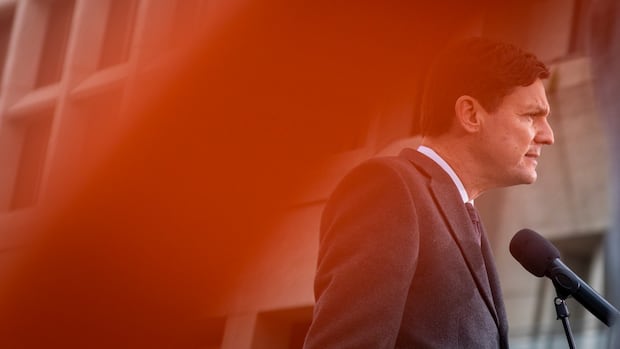British Columbians should rethink their vacations to the United States in light of Donald Trump’s tariff threat, Premier David Eby said Tuesday.
The U.S. president said Monday that 25 per cent tariffs on Canadian goods could take effect as soon as Feb. 1, which Eby called a “deliberate economic attack” on B.C. families.
“We should really be thinking carefully about spending our money in that country,” he said. “We will not spend money in a country that wants to do economic harm to Canadians.”
Eby stood by his support for retaliatory tariffs on U.S. imports, such as Florida orange juice. He did not rule out other measures, such as banning the sale of U.S. wine and liquor in B.C. stores, charging U.S. trucks to drive through Canada to get to Alaska or banning American companies from bidding on B.C. infrastructure projects.
B.C. Conservative leader says stance will only hurt workers
John Rustad wrote on social media that Eby is “focused on framing Trump as a political enemy.”
He said Eby’s NDP only cares “about playing partisan politics for their own gain, not about standing up for workers — that’s why they’re not trying to de-escalate and help British Columbians avoid tariffs, economic hardship, and chaos.”
With U.S. President Donald Trump seemingly holding off on imposing 25 per cent tariffs on Canadian goods, Alberta Premier Danielle Smith spoke to The National’s Adrienne Arsenault about how tariffs could be avoided in the future and America’s reliance on Alberta oil.
Eby says communicating the economic toll that tariffs will take on Americans in terms of higher prices is the only way to stave off the threat.
The premier also announced a new task force on trade and economic security, which includes representatives from the business, Indigenous and labour communities to co-ordinate a provincial response to the tariff threat.
It will be co-chaired by Bridgitte Anderson, who heads the Greater Vancouver Board of Trade, Jonathan Price, CEO of Teck Resources and Tamara Vrooman, CEO of the Vancouver International Airport.
- How might tariffs from the United States change your day-to-day life as a consumer? If the change will affect the way you spend or travel, let us know by emailing ask@cbc.ca.
Eby stressed there will be First Nations representation on the task force.
This follows criticism from Chief Cheryl Casimer, who heads the First Nations Summit, that First Nations voices have so far been left out of the discussions on Canada’s tariff response.
“We have not yet been approached to be participants in any discussion relating to tariffs,” Casimer said. “We haven’t been invited to be part of Team Canada yet.”

Casimer, Grand Chief Stewart Phillip of the Union of B.C. Indian Chiefs and Chief Terry Teegee of the B.C. Assembly of First Nations spoke alongside Eby Tuesday morning ahead of the NDP cabinet’s two-day meeting with First Nations leaders in Vancouver.
Teegee warned that tariffs threaten the stability of natural resources sectors that many First Nations communities rely on, including forestry, mining and natural gas.
“A lot of the industry that we’re a part of is resource-based… and [tariffs] would definitely cause a downturn,” Teegee said. “This is why we should be a part of these discussions.”


